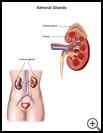
Cushing's Syndrome (Excess Cortisol Hormone)
________________________________________________________________________
KEY POINTS
- Cushing's syndrome happens when your body has been exposed to too much cortisol, a hormone made by your adrenal glands.
- The treatment depends on the cause. Your healthcare provider may change your medicines, or advise that you need surgery or have chemotherapy or radiation therapy.
- Follow the full course of treatment prescribed by your healthcare provider. Don’t stop taking your medicine or change the way you take it unless your provider tells you to.
________________________________________________________________________
What is Cushing's syndrome?
Cushing's syndrome is a problem that happens when your body has been exposed to too much cortisol. Cortisol is a hormone made by your adrenal glands. Your adrenal glands are located near the top of each kidney. Hormones are chemicals made in the body that help with many functions, such as growth, development, and keeping blood pressure and blood glucose (sugar) under control.
Cortisol controls the way your body turns the food you eat into energy. It also controls body functions such as blood pressure, blood glucose levels, and how your body responds to stress. Cortisol has many important functions:
- It helps the body get energy from the sugar and fat in the foods you eat.
- It helps the body respond to physical stress from injury or surgery. For example, it helps keep blood pressure normal in spite of blood loss from an accident.
- The body also makes extra cortisol during the stress of emotional problems such as depression.
What is the cause?
Your cortisol levels may be too high if:
- You take high doses of steroid medicine or take steroid medicine for a long time. Steroid medicine is a man-made form of cortisol that is used to treat conditions such as asthma, rheumatoid arthritis, or lupus. It’s also used to help keep the body from rejecting transplanted organs. For example, if you have had a kidney or other type of transplant, you may need to take a steroid medicine for the rest of your life.
- Your body is making too much cortisol. This is called Cushing’s disease. This most often happens because of a noncancerous (benign) or cancerous (malignant) tumor in the pituitary gland. The pituitary gland is located at the base of your brain. Your pituitary gland makes many different hormones that affect nearly every part of your body. Cushing's disease is more common in women.
Less often, benign tumors or cancer in your adrenal glands, thyroid gland, pancreas, or lungs may cause your body to make too much cortisol.
What are the symptoms?
Symptoms may include:
- Round face (often called moon face)
- Weight gain
- Increased fat in your belly and upper back
- Easy bruising of the skin
- Stretch marks on the skin from weight gain, especially on the belly, breasts, and thighs
- Feeling very tired and irritable
- Weak muscles and weak bones
- More facial and body hair in women
- Irregular or missed menstrual periods
- Loss of interest in sex
Too much cortisol can cause high blood glucose (sugar) and type 2 diabetes. It may also make it harder to control your blood glucose if you already have diabetes.
How is it diagnosed?
Your healthcare provider will ask about your symptoms and medical history and examine you. Tests may include:
- Blood and urine tests
- CT scan, which uses X-rays and a computer to show detailed pictures of the pituitary and adrenal glands
- MRI, which uses a strong magnetic field and radio waves to show detailed pictures of the pituitary and adrenal glands
How is it treated?
The treatment depends on the cause. If your symptoms are caused by steroid medicine, your healthcare provider may adjust your dosage or try other medicines. When you take steroid medicine, it’s very important to follow your healthcare provider’s directions exactly. If you lower the dose too quickly or stop it suddenly, it can be dangerous, even life-threatening to you.
If you have a tumor that is making cortisol, your may have one or more of these treatments:
- Surgery to remove the tumor
- Radiation therapy, which uses high-energy X-rays to kill tumor cells
- Chemotherapy (anticancer drugs), which uses medicine to kill tumor cells
Your symptoms will slowly lessen after the tumor is treated. You will need to be checked regularly after treatment to make sure the tumor does not come back and to check hormone levels.
How can I take care of myself?
Follow the full course of treatment prescribed by your healthcare provider. Don’t stop taking your medicine or change the way you take it unless your provider tells you to.
Keep all appointments for tests. The tests can help make sure you are getting the right amount of medicine.
If you have become very weak or have weakened bones (osteoporosis), you may need physical therapy. You may need medicine to make your bones stronger.
Ask your healthcare provider:
- How and when you will get your test results
- How long it will take to recover
- If there are activities you should avoid and when you can return to your normal activities
- How to take care of yourself at home
- What symptoms or problems you should watch for and what to do if you have them
Make sure you know when you should come back for a checkup. Keep all appointments for provider visits or tests.
How can I help prevent Cushing's syndrome?
If you are taking steroid medicine for a medical problem, keep all of your follow-up appointments with your healthcare provider. Your provider will check for signs of Cushing's syndrome and the problems it can cause.

